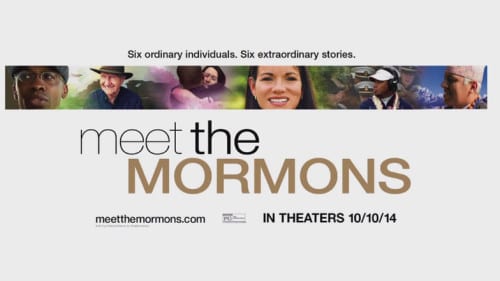I don’t often like documentaries. And I don’t usually look forward to seeing Church films. I felt compelled to see “Meet the Mormons” probably for the same reasons I feel compelled to vote. Not because I really believe that my vote will be the one to put my candidate in office, but because I feel a civic (in this case, religious) responsibility to lend my support to a cause in which I believe. But although I was skeptical of how much I would enjoy the film, I was pleasantly surprised, and even moved, by “Meet the Mormons.” However, perhaps predictably, the movie critics have not been very supportive.
As I’m writing this, “Meet the Mormons” has tanked at a zero percent on Rotten Tomatoes. (Interestingly, out of 2,599 ratings, it has a 91% positive score from audiences.) Every reviewer from the New York Times to the Salt Lake Tribune agrees that this movie is simply an extended infomercial: A “slick” production that does not confront the more “controversial aspects” of the religion’s past.
It seems that when a movie critic is forced to acknowledge that a movie has high production value with great music and gorgeous cinematography, but the critic does not want to give a positive review, he will say that the movie is “slick.”
The only real criticism of the movie is that it does not go into more depth into the history, doctrine and practices of the Mormons. The critics seem especially put out that the Mormon Church has not produced a documentary about how racist, homophobic and paternalistic the Church is. However, to criticize “Meet the Mormons” for not being a stark expose of Mormonism seems a bit like criticizing “The Godfather” for not having enough song and dance numbers; or criticizing a “Fast & Furious” movie for not providing enough thoughtful social commentary. It is criticizing a movie for not being something it did not purport to be.
This is “Meet the Mormons.” It is not “Mormon Doctrine 101” and not “Mormonism Exposed!” It is intended merely to be an introduction to a handful of diverse individuals who are Mormons who have interesting stories, and who give the audience a good idea of what Mormons are like. And as a Mormon, this introduction felt authentic to me. I did not feel like these people were pretending to be something they were not. Although there were some aspects of their lives that were unique and unusual, they were very much like Mormons with whom I associate every day.
Of course, when you first meet someone, they typically put their best foot forward. You may or may not have a good first impression, but, unless you are naïve, you don’t believe that you are able to glimpse deep inside the soul of the person from a first meeting. And you would not be shocked or offended if they did not share all of their faults in that first meeting. Nevertheless, you would hope to feel that the person you are meeting is being genuine. And if after a first meeting, you are interested in learning more, the introduction has probably been successful.
The common theme among movie reviewers is not that the movie failed in its method of presentation. But that the movie left them wanting to learn more. The reviewers seemed uniformly impressed with the people they met. They simply wanted more to know more about them, how they lived and what they believed. Rather than a sign of failure, it seems to me that for a movie that purports only to be an introduction, this is a sign of success.

